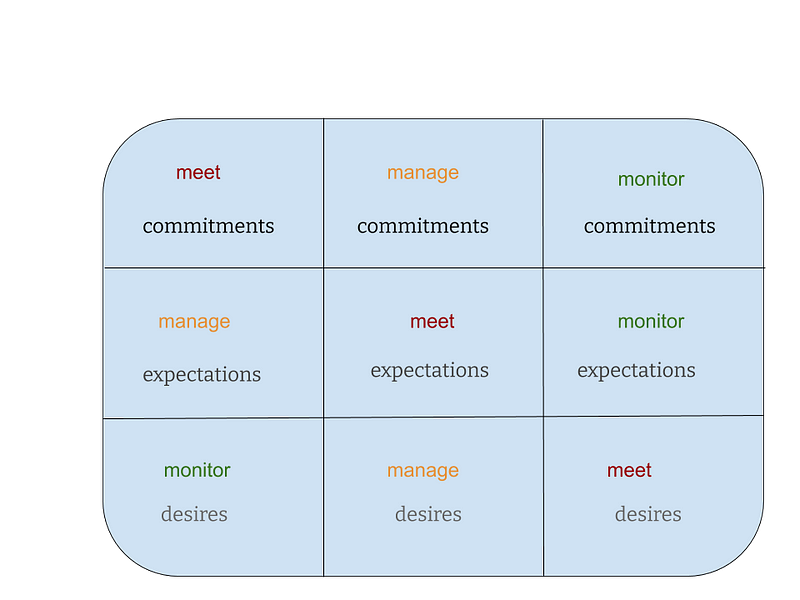It’s all about relationships, and about 3 nouns and 3 verbs

Photo by Randy Fath on Unsplash
Every once in a while, I trip over an interesting reframing opportunity. A few years ago was a great example of that. I moved from a more tactical role in my day job to a strategic sales role. But I wasn’t given a pre-packaged training plan, and had to hit the ground running in adjusting to the new job.
I ended up going to a 1-day off-site training session on sales management. It was eye-opening — mostly due to one phrase that I heard there: it’s all about relationships. That is to say, manage the relationships, and you do 90% of the work needed to get the things done you want to get done.
As months passed, I found that this was true not only of sales, and not only of professional life — but also of life in general. Manage the relationships in your life, and you do 90% of the important work, if not more.
That’s not to say that the remaining 10% takes care of itself, but it is to say that the remaining 10% of stuff relies on having a solid relationship in place. If you don’t have a solid relationship in place with those involved in doing the rest of the work, that 10% becomes pretty difficult.
Relationships are Work, But the Best Kind
So I started thinking about my work in terms of relationships. Rather than looking at list of goals, projects, and tasks, I began looking at a list of relationships. It looked more like a list of people, but it served two important purposes.
First, seeing what work I was doing for what person helped me prioritize better. I can get a rough idea of which projects are more important for the person in question pretty quickly. And as I continue to track and prioritize work, I can see which relationships and which projects for each relationship were more important. It’s the kind of sorting and ranking criteria that’s intuitive, and feels much smoother as you’re doing it.
Secondly, looking at relationships above tasks and projects calmed down my anxiety at seeing so many projects and tasks I wasn’t doing. I realized that rather than 70 projects on my list, I had 16 significant relationships I was trying to manage.
So if one person had 10 projects associated with them, it was a lot easier for me to go to that person. I could talk with them about what it was reasonable for me to be doing now — which was definitely not all 10 projects. Just like that, a lot of anxiety out the window.
The 3 x 3 Matrix
When it comes to the work of relationships, it fits into 3 categories or types. Those 3 types of work match with 3 types of things to work on, for a grand total of 9 types of actions to take.
They come together to build a 3 x 3 matrix — which can help you better wrap your arms around what you should be working on.

The work you’re doing falls into one of 3 verbs: you’re meeting, managing, or monitoring. You’re doing that work on three different things (the nouns): desires, expectations, and commitments.
So let’s talk about those.
The Nouns
The nouns are things you’re working on. They’re the building blocks of the various relationships — personal and professional — in your life. That includes the most important relationship in your life: your relationship with yourself.
Desires
Desires are weak ties between people. They carry the least amount of weight. You may have a very strong desire for someone to do something, but that alone doesn’t create a reason to hold that person to it. The same is true of yourself. You may desire that you do a certain thing, but until you commit to taking action on behalf of it, don’t beat yourself up for not meeting those desires.
Expectations
These often begin as desires. If I desire something for long enough, it can turn into an expectation. Expectations carry more weight, because if they are not met, that negatively impacts the relationship. That is why managing desires is a key practice — if you can keep these desires from maturing into expectations, you can save yourself a whole lot of pain.
There are also negative expectations — which aren’t rooted in desire. A person may become disillusioned or pessimistic about someone or something, and begin expecting things that they don’t desire. A good example is a parent who continues to miss their child’s games or recitals. The child desires that the parent be there, but after that desire continues not to be met, they form an expectation that it won’t be.
Commitments
Of the 3 nouns, commitments carry the most weight. A commitment is exactly what it sounds like. When one person tells another person that they will make something happen. Commitments have the power to form additional expectations and desires, or they can be the culmination of a desire, turned expectation, which is then solidified by someone else.
Either way, commitments are the most important thing to meet, manage, or monitor. Your commitments are your currency. If you fail to meet your commitments more than a few times, it has a negative impact on your relationships. It damages them by eroding trust and/or confidence — which takes a lot of time to get back.
The Verbs
The verbs are the actions your taking that have to do with the building blocks of your relationships. They’re a broad category of action that can take different forms, depending on what’s at stake. But the actions we take on any given day can be classified into one of these 3 categories.
Meet
Meeting or exceeding your commitments is paramount to being effective at whatever you do in work or the rest of your life. Meeting the expectations of others is important as well. And meeting or exceeding the desires of others you care to can be a great way to build that relationship when it’s new or has been lagging.
However you look at it, the work of meeting is difficult, because it tends to require clarity. You need to be clear on the commitment, expectation, or desire you’re aiming to meet before you can have any hope of doing so. That often requires a lot of communication.
Manage
When something changes from a desire to expectation, you may not notice it — until it’s too late. There is a difference between the two. An expectation holds a lot more weight in a relationship than a mere desire. However strong a desire may be, it still isn’t expected.
If you can manage to make sure that unrealistic desires others have of you don’t turn into unrealistic expectations, you’ll prevent a lot of stress. Managing requires a lot of strategy and communication work. You need to listen and read between the lines. But doing it now will prevent a lot of other work later — after expectations have gone unfulfilled
Perhaps the most difficult, but important work is managing commitments. There are all sorts of things that we commit to, or that others think we committed to, and we know we won’t be able to meet them. So we manage them. We call and explain the situation. We apologize. We ask if we can move the timeline out, or deprioritize other stuff, so you can meet this commitment. It’s tough at times, but it’s effective, and it retains trust and confidence.
Monitor
Both meeting and managing things require a lot of activity. Monitoring usually doesn’t. It can require regular check-ins, conversations, or just emails and texts. But generally, it simply requires being aware of how things in are in the relationships in question.
When it comes to your relationship with yourself (again, a truly valuable relationship), this is where journaling is key. A daily journaling habit is your way of monitoring yourself. You can see what things are bubbling up in your own head. Have you made commitments with yourself you’re not going to keep? What desires do you have that are pulling at you? What expectations do you have, that you might need to better manage — before they lead to disappointment and anxiety?
Prioritizing
The great thing about this matrix is that it provides a framework for prioritizing effectively: Start with your commitments, and work your way down.

Meet the commitments you can. Manage the ones you don’t think you can, and monitor things to make sure you’re not casually committing to things (which happens).
Manage people’s expectations (including your own), so you can meet the ones that will help your relationships. Monitor what kinds of expectations are out there. They pop up randomly — even within your own mind. Make sure expectations that pop up, but are unreasonable, get addressed (managing).
Monitor desires, and when you see really strong ones that are affecting the relationship, manage them. If you can, and it will really put the icing on the cake of the relationship, meet some of the desires. But don’t put yourself in a position to try to meet every single desires people have of you (again, including yourself). That’s a fast track to burnout.
Of the 3 nouns at play here, desires are the ones that are least rational, and that you have the least influence over. So simply monitor them and manage the ones that become significant. Otherwise, focus on your commitments and the expectations in play.
If you found this useful, consider subscribing to my newsletter, Woolgathering. You’ll get a roundup of my writing, and other stuff to help you get more productive.